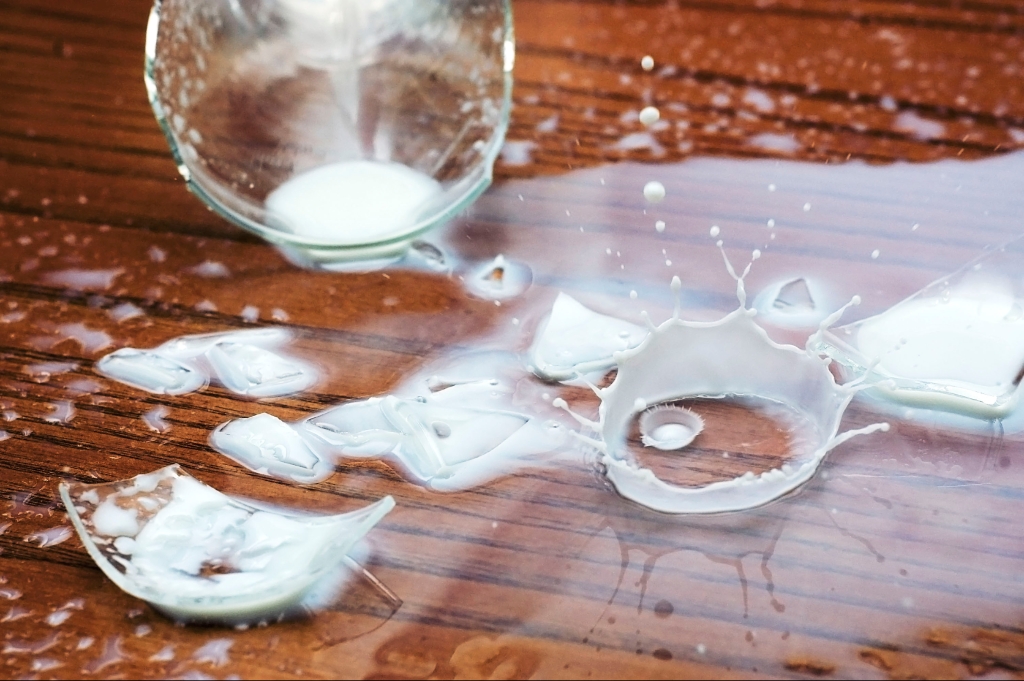Spilled Milk
“No use crying over spilled milk!” is a well worn proverb and most likely, evolved from Europe where fairy lore was much beloved (fairies love milk). But, apparently, my Latvian mother was not a strong adherent.

To be fair, she is a product of the great depression that affected Europe nearly as much as the U.S. She knew what it meant to be poor and hungry. And then there was the Second World War when food was rationed and, unless a generous farmer lived nearby, milk and butter were rare.
That’s the back story to the physical realities that caused a brutal slapping across my head and face for trying to carry too many glass quarts of milk from the milk box into the house and to the kitchen (Note: Our portion of the house was like an odd railroad apartment: big room was family room, medium sized room was master bedroom, and kitchen. My brother and I shared an small room off the big room. We shared the bathroom with three upstairs “tenants.”) Anyway . . . to avoid dropping the quarts on the floor, I dropped them instead on my mother’s bed, thinking it was soft and would absorb the jolt. I didn’t consider the bottled striking one another. What a mess.
I was ten.
There is a deeper message here. The yelling and hitting obviously made a deep impression since that incident was over fifty years ago and I remember it vividly. But I also learned that my mother was deeply triggered by loss and waste.
As an immigrant after WW2, in 1951, she and my elderly father (25 years her senior), and my 5-year old brother [I was still in the womb], suffered many losses to come to this country. Identifying as Latvians after the war, they were shuttled from one displaced persons’ camp to another. With each truck ride, something more was left behind. No room, no room.
Before the war, in the late 30’s, my mother worked as a nanny for a wealthy German ship baron with a great fleet of merchant ships. As repatriation began in the 30’s to return to “Mother Germany,” this shipmaster decided to move his entire operation to Germany. Did Herta want to go with the family? They promised to take care of her. Besides, she spoke both fluent German and Latvian and some decent English to boot. She was a vibrant 20-something and it sounded like the opportunity of a lifetime. Or, so it seemed.
How could she have known what the war and the Third Reich would bring to her small bubble of a life? How could she have known that she would lose her only brother to the war, never see her father again or her stepmother, and within ten years, have nothing but a single trunk of clothes, pictures, books and memorabilia. And a guitar that was left at Grand Central Station: no room, no room.
In this country, during the 50’s, she and my father did the best they could. He spoke no English. They were janitors mostly and lived off the generosity of others. Eventually, my mother got a full-time office job as a clerk (a job she held for 30 years). They bought an old house near downtown Indianapolis and rented three rooms upstairs to make ends meet.
Then my father died at age 72. Once again, the loss overwhelmed her.
I believe, now, the anxiety and fear of raising two children alone in this strange new land, with very little income, no car (or driver’s license), and no ready understanding of how this country worked, took a great toll on her psyche.
Yes. On the day I broke those bottles of milk, they also broke my mother.
Posted on September 22, 2020, in Memory, Mother and tagged family, immigrants, Latvian, losses, mother, sorrow. Bookmark the permalink. 2 Comments.
Wow. I could actually feel your pain and totally understand hers as I read this. Very touching. Thanks for sharing.
Very interesting and vividly written.
Is this going to be in a book? I’d read it!